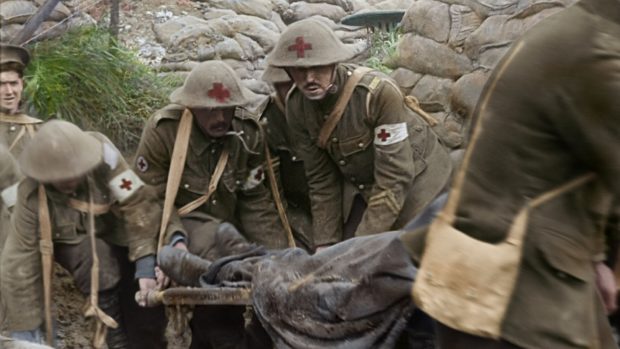
 100-year-old films of the British Army in the trenches have been digitally restored and colorized by New Zealand director Peter Jackson, in a stunning and vivid resurrection of the lived experience of World War One.
100-year-old films of the British Army in the trenches have been digitally restored and colorized by New Zealand director Peter Jackson, in a stunning and vivid resurrection of the lived experience of World War One.
From 2014 to 2018, many nations observed a solemn centenary. It had been 100 years since the Great War, as it was called during the time it was waged—what we now refer to as the First World War. It seems, of course, a very distant time to us, not only because it was a century ago, but because the world has changed so much since then. Now, New Zealand director Peter Jackson, famous for the Lord of the Rings and Hobbit movies, among others, stunningly brings that war and that era to life again in his new film They Shall Not Grow Old.
In 2015, Jackson was approached by the BBC and the Imperial War Museum, who offered him the use of about 100 hours of original footage from World War One, covering a vast number of subject areas: the home front, war on the sea and in the air, the army on the Western front, and more. All they asked is that he use the material to make a film, in their words, “in a fresh and original way,” and without any modern footage. Also in the archives were about 600 hours of recorded interviews from the ‘60s and ‘70s with veterans of the conflict.
As it turns out, they chose their man well. Jackson is a very serious World War I buff, and with his experience in the creation of digital effects, someone who was not daunted by the prospect of restoring 100-year-old films. He and his team, for naturally it took a large dedicated crew to make this happen, decided to just focus on the experience of the British infantry in the trenches of the Western front, largely in France and Belgium. There is no narration, no explanation of the political and historical causes of the war. It is dedicated solely to the experiences of ordinary soldiers. And this exclusive focus was a perfect strategy, helping to make what we’re watching immediate and visceral, by not distancing us with abstractions.
For fifteen minutes or so, we see old black and white footage of young men lining up to enlist in 1914, going to boot camp, and finally being shipped off to the front. On the soundtrack, the actual voices of veterans tell us their thoughts and feelings at the time. Many of them stress, surprisingly, that they have no regrets, that they did what they had to do, and in some ways really loved the excitement of war. So right away, these men are telling us that they don’t see themselves as victims: they chose this path, and are even glad that they did. Nevertheless, the footage will allow us to draw our own conclusions.
Then, after this introductory section, and as we finally get to the front, a remarkable transformation occurs. The old footage comes alive in color, the scratches and the shaky quality are mostly gone, there’s a depth perception that makes it all seem like we’re right there. And the silent footage—there was no sound film yet in those years—now has a soundtrack, with booming guns, tramping through the mud, galloping horses, and even, occasionally, speech, the latter accomplished by lip reading and voice actors. I had to keep reminding myself that this was the real thing, that these were the actual human beings that were recorded there, because the restoration makes it seem almost as if it’s all being reenacted.
The incredible technical feats involved in digitally restoring these old films until they look new and pristine, are explained by Jackson himself in a short epilogue to the film. But more than a mere fascination with the past, the picture brings home the devastating reality of the war. Be warned: the camera shows us the sickening carnage, the piles of dead bodies, without flinching. And as the film proceeds, the veterans confess how weary and wounded and traumatized they became. Over 700,000 young British men were killed on the Western front, an unimaginable number at the time. This is also a reason why colorizing was a good choice. Black and white symbolizes the distant past for us now. But these people lived and died in color, and to see it that way is to make it that much more real.
In my attempt to praise this amazing movie, words are beginning to fail me. The title They Shall Not Grow Old, is from a poem of that time called “For the Fallen.” It is a somber title because the reason they shall not grow old is that they have been killed, their futures taken away, from us as well as them. They Shall Not Grow Old, the film, resurrects them again: we see their faces in the light of fate and immortality, a vision of grief and honor.

